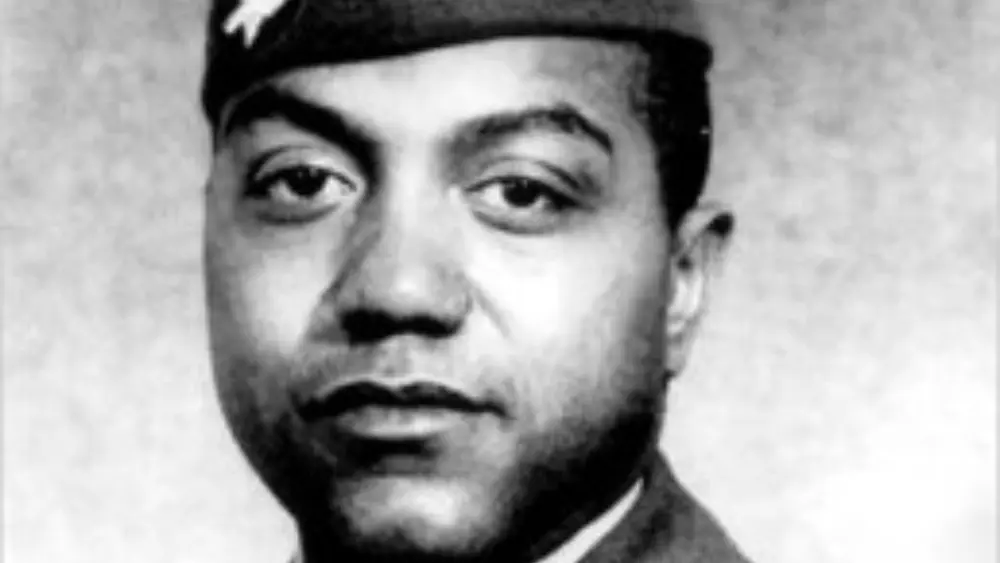Vernon Joseph Baker was a U.S. Army officer who served during World War II and the Korean War. He was honored with the Medal of Honor in 1997 for his bravery during a battle in Italy in 1945. Alongside six other Black soldiers, Baker received the award, making them the first Black Americans to be recognized with the Medal of Honor for their World War II service. President Bill Clinton presented the medals to Baker and representatives of the others at a ceremony in the White House. Baker passed away in 2010 and was buried in Arlington National Cemetery.
Early Life and Military Service
Vernon Baker’s remarkable journey towards heroism was rooted deeply in his early life and dedication to military service. In a pivotal moment in 1941, just before the United States entered World War II, he made the momentous decision to enlist in the U.S. Army.
This decision would set the course for a life defined by sacrifice and courage. Baker’s commitment to serving his country led him to the 92nd Infantry Division, a segregated unit grappling with the pervasive racial prejudice and discrimination of the era. However, in the face of these challenging circumstances, Baker’s resolve to serve and excel in his role remained unshaken.
Baker’s initial experiences in the military served as the crucible for the extraordinary heroism he would later exhibit in combat. His journey, from the moment he enlisted to the harrowing battlefields of war, ultimately climaxed in action. This step earned him the Medal of Honor, the highest military decoration in the United States.
It solidified his place in history as an enduring symbol of bravery and resilience. It became a testament to the indomitable spirit of those who, like him, overcame discrimination to serve their country.
Vernon Baker’s story is a powerful reminder of the bravery and sacrifices of those who refused to be held back by prejudice, proving that courage can shine even in the darkest times.
Vernon J. Baker: Medal of Honor
The indomitable valor of Vernon J. Baker shone brightly during the harrowing Battle of Viareggio, Italy, in April 1945. Confronted by formidable odds and an entrenched enemy, Baker rose to the occasion with unparalleled courage and leadership.
At the helm of his platoon, amidst a storm of relentless enemy fire, he fearlessly engaged multiple fortified positions and swiftly neutralized numerous enemy combatants.
Also, his actions stood as a beacon of exceptional bravery and unswerving determination in the darkest of times.
Even amid the chaos of intense combat and despite suffering multiple wounds, Baker continued to lead by example. His commitment to the mission became a wellspring of inspiration on the battlefield. Vernon also dedicated himself to preserving the lives of his fellow soldiers.
Furthermore, His fearless leadership and valorous deeds played an instrumental role in the mission’s success. It also safeguarded his comrade.
Recognizing his extraordinary heroism during this pivotal battle, Vernon J. Baker was bestowed with the Medal of Honor. It is a prestigious testament to his selfless dedication and remarkable courage under the most unforgiving of circumstances.
In the annals of military history, Vernon J. Baker’s heroism at the Battle of Viareggio serves as a timeless reminder of the extraordinary sacrifices made by individuals in the service of their country.
His determination, unwavering courage, and bold leadership continue to inspire generations. It truly highlights how one person’s actions can leave a lasting impact in the heart of war.
The Long Road to Recognition
Vernon J. Baker’s journey to official recognition of his heroism was a protracted and poignant one, spanning over five decades. In 1997, nearly half a century after his remarkable acts of bravery during World War II, President Bill Clinton awarded him the Medal of Honor.
This belated acknowledgment of Baker’s extraordinary courage underscored a glaring issue of racial disparities within the U.S. military at the time.
Baker’s delayed recognition was emblematic of the systemic racial injustices that had persisted during World War II, which had prevented many deserving African American soldiers from receiving the Medal of Honor for their valorous actions.
Despite their remarkable bravery and sacrifices on the battlefield, these soldiers faced discrimination and unequal treatment within the military.
Baker’s eventual recognition served as a powerful reminder of the need to rectify these historical injustices and to honor the contributions and sacrifices of all individuals who had served their country with valor, regardless of their racial background.
His long-overdue award illuminated the broader issues of racial inequities and paved the way for a more inclusive and equitable recognition of heroism within the military’s ranks.

Vernon J. Baker: Post-War Life and Legacy
After the tumultuous years of World War II, Vernon J Baker transitioned back into civilian life, a transformation emblematic of the resilience displayed by countless Veterans during the post-war era.
Settling into his new life, Baker embarked on a career with the U.S. Postal Service, showcasing his commitment to public service even in peacetime. This transition from a wartime hero to a civilian worker speaks to his humility and dedication to contributing to society beyond the battlefield.
However, Baker’s post-war journey was marked by more than just a career change. His experiences during the war profoundly influenced his life’s trajectory.
Moreover, he became an active member of Veterans’ organizations. This is where he found camaraderie with fellow soldiers who had shared in the crucible of combat.
Beyond this, Baker dedicated himself to advocating for racial equality. It recognized that the same principles of justice and freedom. For which he had fought on the battlefield should be upheld on the home front.
His commitment to this cause demonstrated the enduring impact of his wartime experiences on his values and actions in the post-war years.
Vernon J. Baker’s post-war life and legacy were defined by a commitment to service, both in his career with the U.S. Postal Service and in his passionate advocacy for racial equality.
His journey reflects the broader experiences of many World War II Veterans who witnessed the horrors of war. They returned to civilian life with a renewed sense of purpose and a determination to make lasting contributions to their communities.




